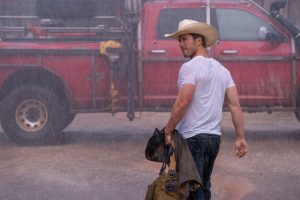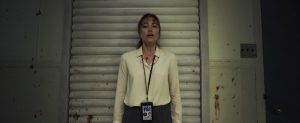Reviews include Deadpool & Wolverine, Doubles, and Mountain Queen: The Summits of Lhakpa Sherpa.
TFCA Friday: Week of June 4
June 4, 2021

Welcome to TFCA Friday, a weekly round-up of film reviews and articles by TFCA members.
In Release this Week
Ahead of the Curve (dir. Jen Rainin and Beth Medow)
“[T]he directors make a conscious effort in making her doc more widely appealing in its content,” says Gilbert at Afro Toronto. “The result is an interesting and insightful documentary that affects more of the LGBT community.”
“For a lot of us who identity as queer, visibility often means recognizing oneself or one’s story in the words of someone who was brave enough to articulate their experiences in a public way. This film salutes the writers who take these bold leaps,” writes Pat Mullen at POV Magazine.
The Amusement Park (dir. George A. Romero; June 8)
“Filmed in 1973, Romero’s barely feature-length movie was an experiment of sorts,” explains Barry Hertz at The Globe and Mail on this exorcised gem. “After birthing the contemporary zombie movie with 1968′s Night of the Living Dead, which threaded fantastical horror with the very real social terror of racism, Romero was commissioned by the Lutheran Society to make an educational film tackling a different kind of nightmare: ageism. But the end product was so disturbing and so (intentionally) ugly to experience that the organization refused to release it, and the surviving prints were lost to the sands of time.”
At Afro Toronto, Gilbert Seah calls it “an absolutely weird film that needs to be seen to be believed.”
Caveat (dir. Damian McCarthy)
At Afro Toronto, Gilbert Seah notes that the film makes “good use of space, lighting, sounds, props and camera placement and angles to elicit solid creepy moments and scares.”
The Conjuring: The Devil Made Me Do It (dir. Michael Chaves)
“If you want nothing more than a few CRANK THE VOLUME jump-scares and some impressive occult-y set design, then this is your kind of Hell,” warns Barry Hertz at The Globe and Mail. “For more discerning cinematic sinners – including those who were impressed by the moody first Conjuring and the kicky kitsch of its spinoff Annabelle Comes Home – here lies been-there-exorcised-that darkness.”
“It’s mildly scary because again, watch the nightly news, but visually interesting,” admits Anne Brodie at What She Said. “It hits the expected marks – broken, raw, elastic bodies, screams and growls, unexpectedly ghastly appearances and long, quiet, edgy sequences waiting for the other shoe to drop.”
Similarly, Gilbert Seah at Afro Toronto finds a “messy and confusing storytelling.”
“It’s a lesser episode to be sure. But Wilson and Farmiga are both so accomplished and comfortable in their roles at this point, that they distract us from the movie’s flaws,” observes Jim Slotek at Original Cin, who suggests that it might be time to conjure a TV series for the Warrens.
Edge of the World (dir. Michael Haussman)
“It’s exotic, violent, colourful, visually beautiful and a powerful indictment of British imperialism,” notes Anne Brodie at What She Said.
“Edge of the World looks totally horrid and false,” counters Gilbert Seah at Afro Toronto. “The film comes across as another white man saves natives unable to rule their own land.”
“It’s tricky to make a story that has us rooting for a British explorer during ‘a time of empires’ as the film’s opening puts it, but Edge of the World tries hard, mostly by making Brooke the least racist guy in the room,” admits Chris Knight at the National Post.
Equal Standard (dir. Brendan Kyle Cochran)
“Equal Standard means well, doesn’t stereotype black or white characters unduly, and offers hope instead of rage,” says Liam Lacey at Original Cin. “The trouble is the movie is just poorly executed. As directed by Brendan Kyle Cochran, the ungainly story is hobbled by erratic pacing, uneven acting, and a lack of momentum. There’s a limit to the number of effective adrenaline jolts that can be gained from watching beefy men yell obscenities and shooting each other.”
Kate Nash: Underestimate the Girl (dir. Amy Goldstein; June 8)
“[M]ore interesting to those both in the recording industry and for singer/songwriters, but the doc is only somewhat interesting for the others and director Goldstein does not appear to try to make Kate Nash a more interesting subject,” says Gilbert Seah at Afro Toronto.
“Once famous singer-songwriter Kate Nash, best known as Glow’s Rhonda Richardson, has a cautionary story to tell,” writes Anne Brodie at What She Said. “At 18 she was a well-known alternative/punk musician, writer and singer, known for her signature wild style as much as her songs – Foundations, Drink About You, Deathproof, Take Me to a Higher Place.”
Little Fish (dir. Chad Hartigan)
“It’s weird to see our world reflected in Little Fish,” observes Chris Knight at the National Post. “But the story would be worth seeking out even if it weren’t such a prescient peculiarity, Contagion meets Eternal Sunshine of the Spotless Mind. That extra frisson of recognition is just the icing on this narrative cake.”
“Here’s a film that wasn’t made to address the pandemic but it does so anyway,” notes Marc Glassman at Classical FM. “That’s good news for a fine little film that just happens to fit into our zeitgeist.”
Open Your Eyes (dir. Greg A. Sager 🇨🇦)
“This one was shot in the midst of lockdown, and it shows. There are only two characters (not counting the cat),” says likely dog person Chris Knight at the National Post, “with screenwriter Jason (Ry Barrett) trying to finish his latest script, while facing distraction from his flirtatious neighbour (Joanna Saul) and from weird noises and leaky walls that might be at least partly in his mind.”
Rockfield: The Studio on the Farm (dir. Hannah Berryman)
“It’s a fascinating part of musical history, hosting rock royalty that included (one per decade since the ’70s to keep the list short) Black Sabbath, Iggy Pop, Oasis, Simple Minds and The Proclaimers,” argues Chris Knight at the National Post. “But Rockfield: The Studio on the Farm…is an underwhelming walk through that history.”
“This documentary is quite possibly the most Baby Boomer-friendly film since Echo in the Canyon and fans of the seemingly endless parade of nostalgic music docs will relish its trip down memory lane,” writes Pat Mullen at POV Magazine.
Spiral: From the Book of Saw (dir. Darren Lynn Bousman)
“Rock’s humour takes a backseat to the film’s main attraction,” admits Thom Ernst at Original Cin. “Carnage is the draw. There are times when Banks’ personal conflicts threaten to hijack the story. There is an almost 30-minute lapse between the first killing and the next. That’s the equivalent of two to three hours in horror-movie-franchise time.
“An exciting and ultra violent no-nonsense crime thriller that does with the explicit warning – See if you dare!” cheers Gilbert Seah at Afro Toronto.
Norm Wilner at NOW Toronto says the film gives fans of the franchise “more of the convoluted plotting, chronological trickery and gotcha endings that ground the series down in the first place. Still, if you want to watch someone’s fingers get pulled off in extreme closeup, where else can you turn?”
Spirit Untamed (dir. Elaine Brogan)
“Bottom line: Spirit Untamed is not very good,” neighs Chris Knight at the National Post. “But it is very busy – there’s a lot of friendship, life lessons and dangerous behaviour crammed into its 87 minutes. If that’s enough for you, saddle up.”
“The three actors imbue the young cowgirls with fun, carefree energy, which makes Spirit Untamed is a sure-fire adventure for young audiences,” says Pat Mullen at That Shelf. “Adults, meanwhile, will appreciate how the adventure harnesses the power of positive representation.”
Thunderbird (dir. Nicholas Treeshin 🇨🇦)
“Suffice to say there’s more going on than mere murder, as the film takes a swerve in the late going into Native mythology,” notes Chris Knight at the National Post. “It’s sudden, and it upsets the idea that this is a just a whodunit, but if you’re OK with a little genre switcheroo, Thunderbird will oblige with a satisfying thrill.”
https://www.youtube.com/watch?v=9KktzvSh_vc
Undercover: Punch & Gun (dir. Koon-Nam Lui, Frankie Tam; June 8)
“From its humour, action and style, it succeeds as a better than average Hong Kong Martial-Arts action flick,” admits Gilbert Seah at Afro Toronto.
Undine (dir. Christian Petzold)
“Undine is an elemental love story that exerts a powerful emotional undertow,” raves Chris Knight at the National Post. “Don’t be surprised if you’re left wanting to dive right back in.”
“[T]his extraordinary film will leave you gasping,” agrees Anne Brodie at What She Said. “Undine is mesmerizing, you can’t argue with mythology.”
“Petzold reunites actors Paula Beer and Franz Rogowski from their previous hit Transit and it works exceedingly well. The two have a great rapport, making the sensual nature of their relationship instantly exciting and natural,” writes Marc Glassman at Classical FM.
“During one romantic and melancholic moment, those lectures about German history become pillow talk between Undine and a lovestruck diver,” says Radheyan Simonpillai at NOW Toronto. “In such scenes, Petzold reasserts his mastery over image, subtext, mood and feeling; and Beer’s intoxicating performance truly grips.”
“[A] terrific romantic drama, similar to Jacques Demy’s Les parapluies de Cherbourg,” declares Gilbert Seah at Toronto Franco.
“Petzold is a filmmaker of seductive skill, who weaves a paranoid atmosphere with unsettling landscape shots, odd intimacy, and taut tension,” notes Liam Lacey at Original Cin. “One can see clear linkages between Undine to the nightmare weirdness of Alfred Hitchcock’s Vertigo, though it’s as if this similar story were drained of its passionate momentum and rendered abstract.”
“And what should we make of the mysterious giant catfish that keeps swimming past? It’s the most engaging cinematic fish since the trout narrator of Denis Villeneuve’s similarly perilous Maelström,” writes Peter Howell at Night Viz.
The Unholy (dir. Evan Spiliotopoulos)
At Afro Toronto, Gilbert Seah says it “would help if the script had made all the events more believable.”
Canadiana and the Power of Representation
Gilbert Seah joins eTalk for a special Asian Heritage Month conversation about Akira Kurosawa and his influence on George Lucas, and points out the homage to Hidden Fortress that opens A New Hope. Watch the video above!
Are the Canadian Screen Awards getting Golden Globed? Probably not, but Barry Hertz at The Globe and Mail reports that CBC has not yet renewed its contract for the award ceremony following news that it would air the celebrations of the inaugural Black Academy Awards. “The CSAs were first presented in 2013, after the merger of the Gemini and Genie Awards,” writes Hertz. “With the exception of last year and this spring – when in-person awards shows were not permitted due to the pandemic – the CBC has broadcast every one of the Academy of Canadian Cinema & Television’s annual marquee CSA galas.”
Meanwhile, brothers Stephan James and Shamier Anderson speak with Barry Hertz at The Globe and Mail about their efforts to spotlight Black talent through the Black Academy and how the ceremony hopes to help inspire change in the Canadian film sector. “There is resistance to the idea of support, from bureaucratic red tape to government grants to what everyone calls ‘envelopes’ to secure funding for programs,” Anderson said. “There has been a lot of saying that we don’t fit this criteria or don’t fit into this box. That’s the resistance, or rather roadblocks, that we’ve been facing.”
At POV Magazine, Pat Mullen profiles emerging filmmaker Niya Abdullahi. She is one of the fellows of this year’s Doc Accelerator Lab and is taking strides to change the narrative about onscreen representation, particularly as concerns Muslim Canadians. “The best way to talk about Islamophobia or to even push people to change the narrative around who Muslims are and reflect our experiences is to give the microphone back to Muslims,” explains Abdullahi. “Or give it to them in the first place.”
Festember – Not one but two TJFFs! And here comes Cannes!
At NOW Toronto, Norm Wilner picks the Toronto Jewish Film Festival as his chosen TJFF and highlights five must-see films. Among the selection are the opening doc Shelter and the indie drama Lune, which both tell Toronto stories. On Shelter, Wilner says, “[T]he archival footage and the present-day testimonials of the surviving entrepreneurs and their families are more than enough to sell the film’s metaphor about literally building a new home after seeing the old one ripped away.”
At Original Cin, Jim Slotek doubles down on TJFFs. He speaks with James Heron, executive director of the Japanese Canadian Cultural Centre, about this year’s virtual Toronto Japanese Film Festival. Of the Grand Jury Prize winner A Garden of the Camellias, announced pre-fest, Heron says, “I really like that film because of the concept of ‘mono no aware’ – the unavoidable impermanence of things in the material world. It’s why cherry blossoms are so important in the Japanese culture and why seasons are important in the Japanese mind.” Slotek also offers some highlights for the Toronto Jewish Film Festival, including Shelter.
At What She Said, Anne Brodie looks at Heidi Ewing’s dramatic directorial debut I Carry You with Me, which has its long-overdue Toronto premiere at Inside Out: “Ewing’s sensitive naturalism gives this poignant story intense intimacy and universality, with haunting scenes crossing the night deserts, evading untold dangers, which have new urgency with what we know now. The New York cityscape and longing daydreams of love and memory are achingly moving.” Brodie also offers highlights from both TJFFs.
At the Toronto Star, Peter Howell breaks down the very exciting line-up announced yesterday for the 2021 Cannes Film Festival. Kissing is a no-go on this year’s red carpet, which follows COVID safety protocols. Although the official competition features nary a Canadian film, it does have one notable entry to represent the maple leaf. The 65 movies in the Official Selection include the world premiere of Aline, The Voice of Love, an unofficial biopic inspired by the life of Canadian superstar chanteuse Céline Dion, which uses Dion’s songs but not the singer herself,” notes Howell. “The Dionesque title character, Aline Dieu, is played by French actress/filmmaker Valérie Lemercier, who also directed the film, which is screening out of competition.”

Summer Movie Reads
At Zoomer, Nathalie Atkinson chats with Charles Casillo about his dual biography about A Place in the Sun co-stars Elizabeth Taylor and Montgomery Clift, Elizabeth and Monty: The Untold Story of their Intimate Friendship. “Monty was always very complicated and complex, introspective and serious about everything, including his art,” says Casillo, speaking about the stars at the time of their big breaks. “[Taylor] was very comfortable with Hollywood, she looked at it as a thing to be played. Monty hated it, was uncomfortable with it, and I think that was one of the big draws to her…She was fun and didn’t look at acting as a tortuous thing you had to go through. Hollywood wasn’t the enemy.”
At The Globe and Mail, Barry Hertz turns the pages of Seth Rogen’s memoir Year Book and imagines that they could easily be BFFs IRL. “There are hilariously bizarre encounters with super-celebrities, such as when Tom Cruise attempted to recruit Rogen and Apatow to the Church of Scientology. Or when George Lucas revealed himself to be the saddest, strangest man on Earth who (maybe?) owns a spaceship hidden underneath Skywalker Ranch,” writes Hertz. “And there are surprisingly lucid flashbacks to the many, many, many times that Rogen got high out of his mind. But for those who pass on grass, don’t worry: Flipping through Yearbook isn’t akin to being cornered at a party by your least-favourite stoner – this is a grade-A comedy supply that provides its own, non-pharmaceutical high.”
https://www.youtube.com/watch?v=miQqyfO66uw
TV Talk: From Mare to There
After Mare of Easttown had everyone sharing their theories about who committed a grisly murder, Glenn Sumi at NOW Toronto unpacks the powerful finale and explains why audiences should expect it to earn a bushel of Emmy nominations: “What’s brilliant about the series is how we’re concerned less with the whodunnit than with how everything affects the characters. After Ryan’s interrogation, a distraught, furious Lori tells Mare that her whole family is gone because of her. Mare has been in this spot a few times, of course; before she discovered the abducted Katie, her friend Dawn had blasted her for not doing her job well; and just last week, the mother of killed detective Colin Zabel blamed Mare for her son’s death.”
When one show ends, another begins. Norm Wilner at NOW Toronto checks out the second season of Feel Good, starring Canuck Mae Martin, which delivers just as strongly as the debut season did last year: “Feel Good takes on quite a lot in season 2, expanding on topics teased in previous episodes and adding heavier questions of gender identity and internalized abuse. (The real Martin identifies as non-binary; the fictional Mae is still figuring that out.) It’s heavier going this time, but that’s not a strike against it: the show has grown, and Martin and Hampson’s focus has shifted accordingly.” He also recommends the new series Sweet Tooth (“takes its sweet time, drifting between multiple storylines that intersect just in time to set up a second season”) and Girls5eva (“a brilliant ensemble, pitch-perfect songcraft”).
At What She Said, Anne Brodie upvotes the doc Who Gets to Be an Influencer?, which explores the exploding biz of social media influencers: “The doc features Atlanta’s Collab Crib, an all-Black media hub of eight aspiring influencers; they live together in an unfurnished rental house and create and post all day long. The more likes they get, the more chances they have to land a lucrative deal. These are smart, strategic and thoughtful kids as well as creatives and artists.” However, binge-watchers might want to reconsider Girls5eva, which is “inane, shrill, cartoony and obnoxious.”
At The Globe and Mail, Barry Hertz delivers an expansive oral history about the former late night film series The Showcase Review, which anticipated the endlessly annoying is-it-film-or-television debate while delivering art-house flicks to Canadians via the tube. “There was a lot of snobbery about TV then and what it meant for films to be on TV rather than in theatres and festivals,” says former Showcase programming associate Noah Cowan. “Making the case for what we’d now see as an art-house streaming service was not obvious at the time. [Alliance Atlantis’s] Laura [Michalchyshyn] would keep pushing us to be more daring.”
What’s left for Canadian TV after Schitt’s Creek and Kim’s Convenience? Radheyan Simonpillai at NOW Toronto reports from the CBC’s unveiling of its new programming. Shows on the horizon include new series from Amanda Parris, Sarah Gadon, and Jennifer Podemski. Simonpillai speaks with Parris about her show, Revenge of the Black Best Friend: “‘The idea came out of my obsession with 90s teen movies and teen shows and my desire to always want to be in them and write them,’ Parris tells NOW. But, she adds, dreaming about a life in 90s teen movies meant coming to terms with the space Black actors occupied. Do you remember Tamala Jones in Can’t Hardly Wait? Didn’t think so.”



